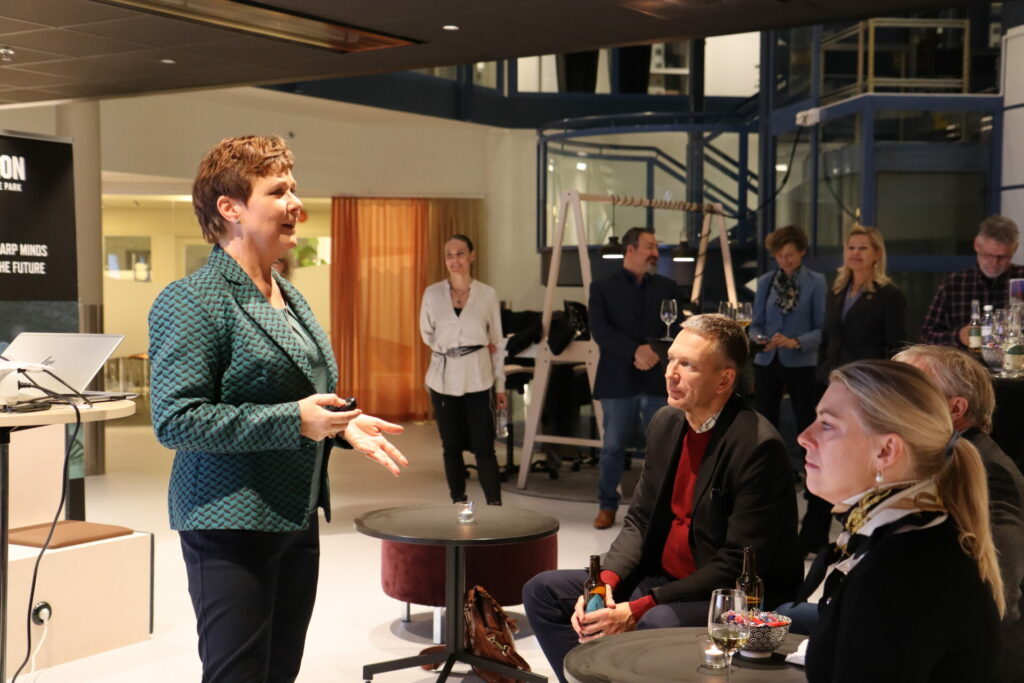At Ideon Science Park, we have the privilege to work with and support tech and deep tech startups and companies.
But what do we mean when we talk about deep tech?
There is not one specific definition, but ‘deep tech’ was coined as an investment term in the startup and venture capital communities. It is used to describe companies that work on cutting-edge technologies based on considerable scientific research, that will help tackle global challenges and push the boundaries of human capability.
Deep tech innovators apply cutting-edge science to defy imagination, reshape the human experience, and solve concrete problems. These startups make research and ground-breaking ideas commercial.
‘Ordinary’ or traditional tech usually involves applying existing technologies to solve problems or improve processes. Deep tech goes beyond the use of existing technologies and delves into scientific frontiers.
Addresses Societal Challenges
Deep tech startups and companies often want to create solutions that help solve problems – to contribute to societal impact. Not seldom do these ventures aim to develop revolutionary innovations that address some of our most pressing global challenges.
The term “deep tech” has gained traction to highlight both the depth of knowledge needed to develop and commercialize them as well as their potential to drive change. Deep tech is therefore seen as a driving force playing a crucial role in addressing issues such as climate change, disease control, food security, and the aging population. Solutions can be predicting natural disasters or detecting diseases.
Developers of deep tech move from research to practical applications, spurring a new industrial revolution, work across various sectors, such as AI, life sciences, agriculture, aerospace, chemistry, industry, and clean energy, and often cross boundaries. You find deep tech innovations in fields like artificial intelligence, biotechnology, quantum computing, advanced materials, blockchain, robotics, drones, and photonics.
Developing and commercializing technologies within these areas are riskier, take longer time, and require more investments to finance longer R&D processes compared to conventional tech companies. Deep tech startups typically hold patents.
What Differs Deep from ‘Traditional’ Tech
What most deep tech innovations have in common is high risk and long timelines to exit. Differences between tech and deep tech regard the depth of the innovation, the amount of R&D needed, the focus areas, and the innovations’ impact on the market:
- Traditional tech innovations often use existing technologies to create progress such as better user experience, efficiency, or new features. Deep tech is more transformative and revolutionary. A deep tech solution typically involves creating an entirely new technology or approach that can impact industries and even society.
- When it comes to R&D, ordinary tech may need some, but prolonged R&D processes are not the emphasis. Deep-tech projects usually require a persistent dedication to scientific research before it is possible to introduce a viable product to the market. Many deep tech startups invest years in research and testing before entering the market.
- Traditional tech can involve a wide range of applications: software development, app creation, website design, and improvements to existing technologies. Deep tech usually focuses on advanced and emerging areas – AI, biotechnology, quantum computing, robotics, and nanotechnology.
- Tech projects usually have a shorter time to market and involve lower risk, since they often build upon technologies that exist already. Deep tech projects often involve a higher risk. Time to market can be long, depending on how difficult it is to overcome scientific challenges.
Tech innovations can have a broad market impact but typically make things better step by step. Deep tech innovations can make a huge and sudden change – more transformative impacts – given their focus on pioneering breakthroughs.
Historic examples of advancements within deep tech, the result of long, scientific processes :
· The telescope – 1608
· The steam engine – 1774
· Anesthesia – 1844
· Steel smelting – 1857
· The lightbulb – 1879
· The first automobile (Benz) – 1886
· The airplane – 1903
· The moon landing – 1969
· The Internet in 1969 (ARPANET), WWW 1989
· Apple’s first PC 1970s, the IBM PC in 1981
· Google – the first novel algorithms – 1990s
· Clinical genomic sequencing – 2014
Meet some of our deep tech startups :
Agrodit: Helping Farmers Know Exactly How Much Water to Use | Ideon Science Park
Lightbringer: Revolutionizing the Patent Process | Ideon Science Park
Cognes: An Innovation that Reads Your Face | Ideon Science Park
THEIR BIG IDEA: ‘The eyes, chico, they never lie’ | Ideon Science Park
Their Big Idea: Instant Clarity with Spec-Imaging | Ideon Science Park
Welfare for Patients, Researchers, and Animals | Ideon Science Park
Sources and read more :
https://dealroom.co/reports/the-european-deep-tech-report-2023
https://www.bvp.com/atlas/state-of-deep-tech
https://www.wolvessummit.com/blog/deep-tech-startups-in-cee
https://techcrunch.com/2020/03/11/what-do-we-mean-when-we-talk-about-deep-tech/
Deep Technology: Definition, Use Cases & Perspectives (jelvix.com)


